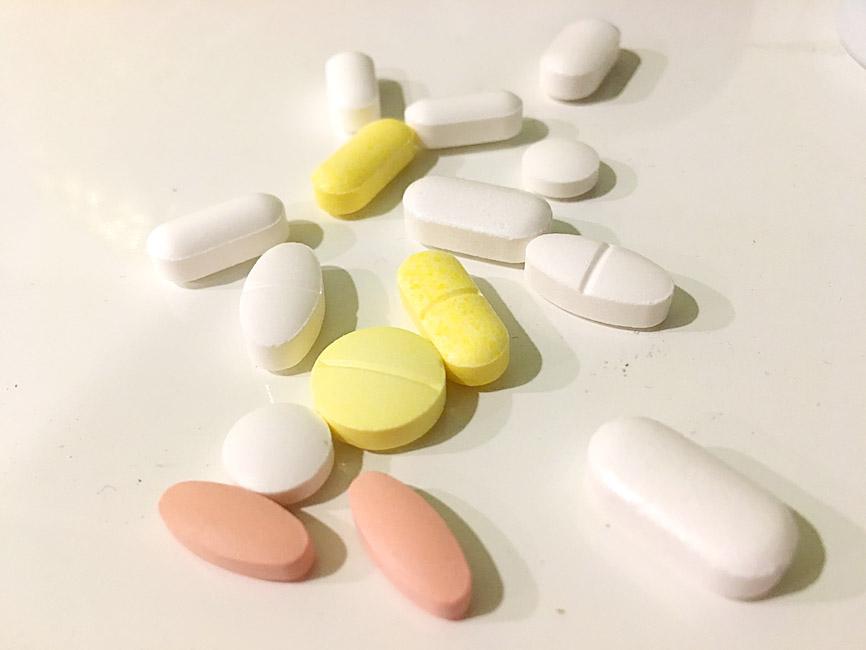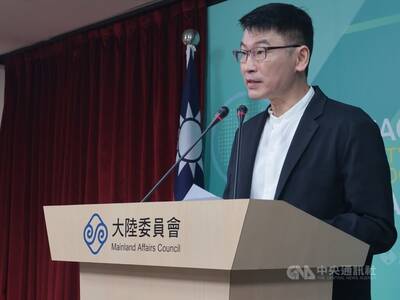Fifty-five instances of drug shortages were reported in the first two months of this year, Food and Drug Administration data showed.
The number of drug shortage reports rose from 189 in 2018 to 355 in 2020, before falling to 225 last year.
Drugs that have been in short supply in the past two years include cardiovascular drugs, anti-infectives, gastrointestinal medicines, metabolic agents, cancer drugs and immunosuppressants, the agency said in an assessment of the shortages.

Photo: Lin Hui-chin, Taipei Times
People with chronic diseases tend to buy their medicines in bulk ahead of the Lunar New Year holiday each year, leaving fewer doses available for clinical uses, drug section head Yang Bo-wen (楊博文) said on Sunday.
However, such shortages are usually short-lived, and supply and demand tend to return to normal after the holiday, he said.
Shortages reported in the past few years could be attributed to the COVID-19 pandemic’s effects on drug manufacturing and shipping, he added.
Yang also commented on concerns that Russia’s invasion of Ukraine could affect Taiwan’s drug supplies.
Government records show that no drug import permits were issued to Russian or Ukrainian firms and that raw materials from Russia are used in the manufacture of only one kind of medicine, he said.
The raw materials can be sourced from other countries, so the supply should not be affected, he added.
For essential drugs, pharmaceutical firms should report possible shortages at least six months in advance, look for replacements and compile an inventory of the drug, Yang said.
If the agency’s assessment suggests the possibility of a shortage of the reported drug, it would publicly solicit pharmaceutical firms’ applications for special approval to manufacture or import the drug, he said.
Most shortages can be resolved by drug replacements or special approval, he added.
Meanwhile, the number of applications to import drugs for personal use rose from 560 in 2011 to 5,818 in 2019 and 10,417 in 2020, a 25-fold increase, the Center for Drug Evaluation said.
The boom might be the result of a more comprehensive system that gathers statistics more precisely, the center said.
The agency urged people only to use drugs that have been approved by the government, so that legal relief can be sought if a drug injury occurs.
Taiwan Pharmacist Association spokesperson Shen Tsai-ying (沈采穎) said that drug shortages have become more common and were exacerbated by the pandemic, port congestion and the war.
Although some drugs can be replaced by alternatives, some people need a certain brand to control their condition, she said, adding that there was once a shortage of a cardiotonic drug that had no replacement.
In addition to the mechanism for reporting shortages, the government should establish a center to actively monitor drug supplies to deal with shortages promptly, she said.
Oliver Hu (胡幼圃), executive supervisor of the Taiwan Society of Health-System Pharmacists and chair professor at Taipei Medical University College of Pharmacy, said that the prices of some drugs covered by the National Health Insurance system are too low compared with prices in other countries such as Japan and South Korea, which causes pharmaceutical firms to prioritize those markets.
Hu suggested that the government compile a list of essential drugs for emergency use and ensure their supplies, and assess the affects of prices on drug supplies.

ENDORSING TAIWAN: Honduran presidential candidate Nasry Afura said that Honduras was ‘100 times better off’ when it was allied with Taipei The Ministry of Foreign Affairs yesterday said it would explore the possibility of restoring diplomatic relations with Honduras based on the principle of maintaining national interests and dignity. The ministry made the remarks in response to reporters’ questions regarding an article titled: “Will Taiwan Regain a Diplomatic Ally?” published in The Diplomat on Saturday. The article said Honduras’ presidential election in November could offer Taiwan the chance to regain an ally, as multiple candidates have promoted re-establishing diplomatic relations with Taiwan. Honduras severed diplomatic ties with Taiwan in March 2023 in favor of Beijing, but since switching its diplomatic recognition,

A fourth public debate was held today about restarting the recently decommissioned Ma-anshan Nuclear Power Plant, ahead of a referendum on the controversial issue to be held in less than two weeks. A referendum on Aug. 23 is to ask voters if they agree that “the Ma-anshan Nuclear Power Plant should continue operations upon approval by the competent authority and confirmation that there are no safety concerns.” Anyone over 18 years of age can vote in the referendum. The vote comes just three months after its final reactor shut down, officially making Taiwan nuclear-free. Taiwan People’s Party Chairman Huang Kuo-chang (黃國昌) represented

Scoot announced yesterday that starting in October, it would increase flights between Taipei and Japan’s Narita airport and Hokkaido, and between Singapore and Taipei. The low-cost airline, a subsidiary of Singapore Airlines, also said it would launch flights to Chiang Rai in Thailand, Okinawa and Tokyo’s Haneda airport between December and March next year. Flights between Singapore and Chiang Rai would begin on Jan. 1, with five flights per week operated by an Embraer E190-E2 aircraft, Scoot said. Flights between Singapore and Okinawa would begin on Dec. 15, with three flights per week operated by Airbus A320 aircraft, the airline said. Services between Singapore

The Mainland Affairs Council (MAC) yesterday announced a ban on all current and former government officials from traveling to China to attend a military parade on Sept. 3, which Beijing is to hold to mark the 80th anniversary of the end of the Second Sino-Japanese War. "This year marks the 80th anniversary of the end of World War II and the Republic of China’s victory in the War of Resistance [Against Japan]," MAC Deputy Minister and spokesperson Liang Wen-chieh (梁文傑) told a regular news briefing in Taipei. To prevent Beijing from using the Sept. 3 military parade and related events for "united